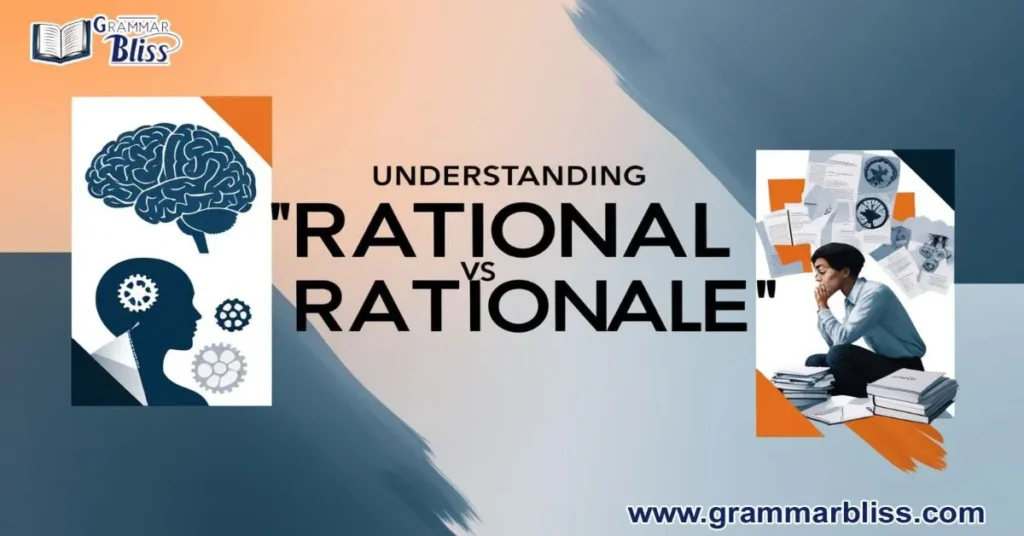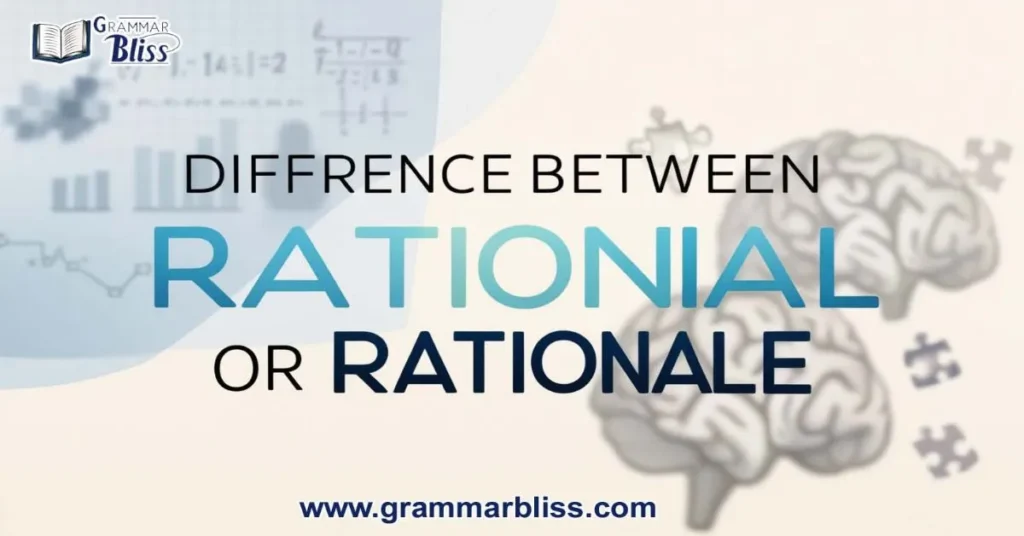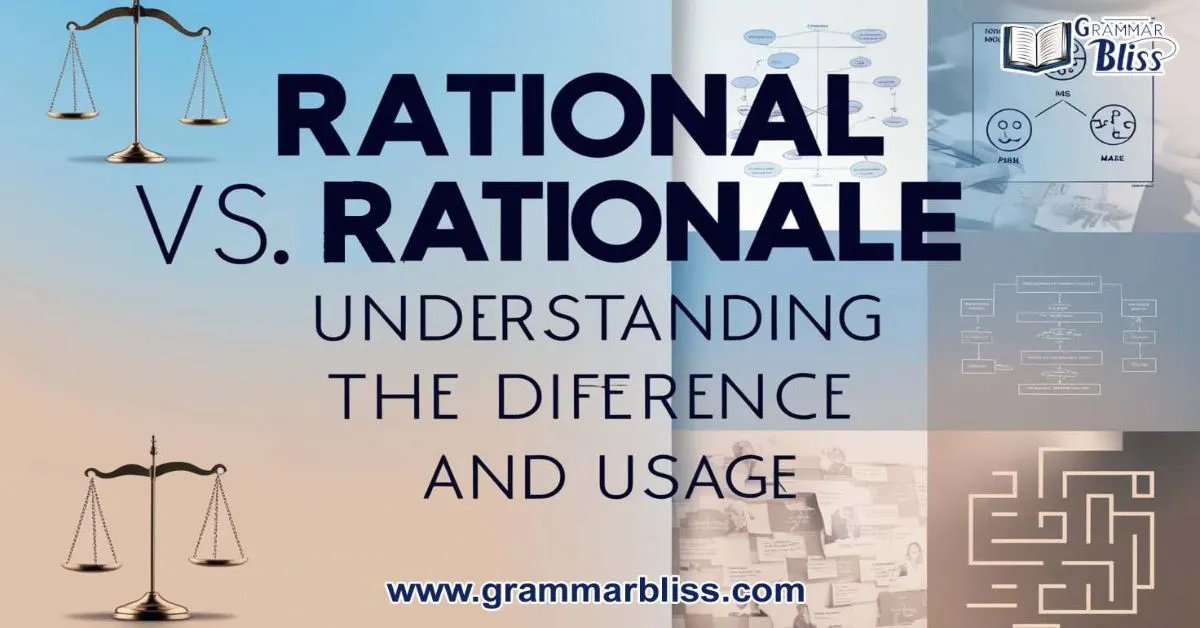Rational vs rationale can often cause confusion due to their similar meanings, but they serve different purposes in language. Understanding the difference between rational and rationale is crucial for effective communication. Rational refers to something that is based on logical thinking, sound judgment, or reasoning.
It describes the thought process or behavior of someone who makes decisions based on facts rather than emotions. On the other hand, rationale is a noun that explains the justification or reason behind an action or decision.
Here, we will explore the meaning and usage of both terms, offering clear reasoning and examples to ensure you grasp their distinct roles in communication.
Quick Summary
At first glance, rational vs rationale might seem interchangeable, but they serve different functions. Rational is an adjective that describes logical thinking or decisions made with sound judgment, while rationale is a noun that refers to the reasoning or justification behind a decision or action. Knowing the difference between these two words will help you communicate your thoughts more clearly and effectively.
Read: irregular-adjectives-understanding-their-forms-and-usage/
Understanding “Rational vs Rationale”

Both rational and rationale come from the same Latin root word, ratio, which means “reason” or “calculation.” However, despite their shared origin, the way we use these terms in sentences is not the same. Understanding this difference is essential to avoid confusion and to communicate more precisely.
While rational describes the thought process or behavior of a person, rationale refers to the explanation behind their reasoning. The two words are related, but each has its own unique role in communication.
Rational: Definition and Usage
Rational is an adjective, which means it describes a noun. It is used to describe someone or something that is logical, reasonable, or based on sound judgment. When we say something is rational, we mean it follows logical reasoning or is based on facts and clear thinking.
For example, if you say, “Her decision to save money was rational,” you are implying that her choice was based on fact-based reasoning and not influenced by emotions. In this case, the person made an objective decision that involved careful analysis and critical thinking.
When we talk about rational thinking, we are referring to a mental process that is structured and follows a logical approach. It is the opposite of irrational thinking, which is often driven by emotions or poor judgment.
Rationale: Definition and Usage
Rationale, on the other hand, is a noun. It refers to the reason or justification behind an action, decision, or belief. When you explain your rationale, you are giving a detailed account of why you made a certain choice or why something happened.
For instance, if a company decides to lay off employees, the rationale might be to reduce costs in response to economic downturns. This explanation is based on a logical analysis of the situation, rather than an emotional reaction to the circumstances. The rationale gives the underlying reasoning or justification behind the decision.
In another example, a teacher might ask you to explain the rationale behind your argument in an essay. In this case, the teacher wants to understand the basis for your logical thinking or evidence-based reasoning that supports your position.
Difference Between Rational or Rationale

The difference between rational and rationale lies in their parts of speech and how they are used in sentences. Rational is an adjective that describes a logical action or behavior, while rationale is a noun that explains the justification or reason behind an action or belief.
Key Differences:
- Rational is used to describe thinking, decisions, or behavior that is based on sound reasoning.
- Rationale refers to the reasoning or justification for something.
For example, in the sentence, “He made a rational decision,” rational describes the nature of the decision-making. In the sentence, “The rationale for his decision was cost reduction,” rationale explains the reasoning behind the decision.
Are They Interchangeable?
No, rational and rationale are not interchangeable. Although they share a common root, using them in the wrong context can confuse the meaning of your sentence.
For instance, saying “Her rationale behavior was impressive” doesn’t make sense because rationale is a noun, not an adjective. The correct sentence should be “Her rational behavior was impressive.”
Similarly, using rational in place of rationale would be incorrect. For example, saying “The rational behind the decision was clear” is wrong. The correct phrase should be “The rationale behind the decision was clear.”
Learn: present-continuous-tense-20-sentences-guide-to-using-it/
Side-by-Side Comparison
Here is a helpful comparison between rational vs rationale:
| Aspect | Rational | Rationale |
| Part of Speech | Adjective | Noun |
| Meaning | Describes logical thinking or behavior | Refers to the reason or justification behind an action |
| Used For | Describing thought processes or actions | Explaining the reasoning or justification |
| Example | “His rational decisions were praised.” | “The rationale for his actions was clear.” |
| Synonyms | Logical, reasonable, sound judgment | Justification, explanation, reasoning |
This table clearly shows the main differences between these two words, making it easier to understand when to use each one.
Everyday Usage Examples
Understanding how to use rational vs rationale in real-world scenarios is important for clarity in communication. Here are some examples:
- “Her rational approach to the problem helped the team stay focused.”
- “The rationale for the new policy was presented in the meeting.”
In both of these sentences, rational describes a logical action, while rationale provides the explanation for the actions taken.
When to Use Rational and When to Use Rationale
It’s important to remember when to use rational and when to use rationale.
You should use rational when you are describing the thought process or behavior of someone or something. For example, “He made a rational decision based on all the available information.”
On the other hand, rationale should be used when you are explaining the reasoning behind a decision or action. For example, “The rationale for the budget cuts was to ensure the company’s survival during the recession.”
Explore: 20-examples-of-past-continuous-tense-master-its-usage/
Grammar Rules and Examples
To further clarify the correct usage, here are some grammar rules and examples for both words.
- Rational is an adjective and should be used to modify nouns. Example: “His rational thought process helped him make the best decision.”
- Rationale is a noun and should be used with verbs like “provide,” “explain,” or “give.” Example: “The rationale behind the policy change was carefully considered.”
Be careful not to confuse the two in your writing. Using them incorrectly can alter the meaning of your sentence.
FAQ’s
- Can I use “rational” when I mean “rationale”?
No, rational and rationale cannot be used interchangeably. Rational is an adjective, and rationale is a noun. - Is it okay to use “rational” as a noun?
No, rational is only used as an adjective. If you want to describe the reason behind a decision, you should use rationale. - What is the etymology of “rational” and “rationale”?
Both words come from the Latin root word ratio, meaning reason. - How can I remember the difference between “rational” and “rationale”?
Think of rational as describing the logical thinking or action, while rationale is the justification or reason behind the thinking or action.
Conclusion
Understanding the difference between rational vs rationale is essential for clear and effective communication. Rational describes logical thinking and sound judgment, while rationale explains the justification or reasoning behind a decision or action. By using these terms accurately, you can improve your decision-making and present your ideas with greater clarity of thought. Whether you’re crafting an argument, making a decision, or providing an explanation, knowing when to use rational versus rationale will help you communicate with precision and confidence.

